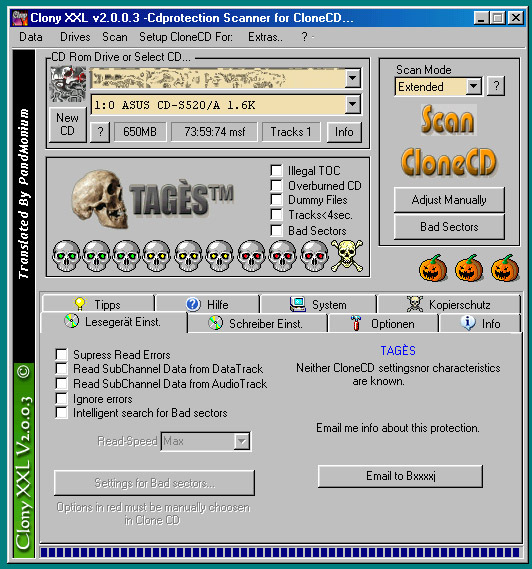Mysteries Of The CDRW and Back Ups Revealed
Copy Protection...What Protection? Continued
TAGES can be implemented at various stages of software development, and its anti-copy functions can be customized to meet the specific needs of developers and publishers. It enables the publisher to choose how the protection affects unauthorized copies, from causing slight modifications to completely blocking the functioning of the software. TAGES is also completely transparent to the end user and does not require any specific set-up or online transaction prior to launching the software.
TAGES uses new encryption and authentication technologies that are compatible with standard multimedia PC computers and drives. To date, very little is known about this copy protection technology, and it has appeared on only one title of which we are aware. What we do know at the time of this article is that, to the best of our knowledge, no one has been able to figure out how to make a back up of a disc protected with TAGES. For users wanting to make a back up copy of a disc using the TAGES technology, this isn't welcome news.
We used Clony XXL to locate a disc that was protected with TAGES for use as test disc 3.
Midbar's Cactus Data Shield is currently in use for audio CDs. Cactus Data Shield claims to offer the ability to prevent any type of unauthorized digital duplication of CDs, DVDs and proprietary formats (music, video or data). Cactus Data Shield does not rely on software keys, hardware dongles, plugs or other external equipment or processes. Cactus Data Shield is designed to fully protect CDs and DVDs, and to be fully compatible with existing commercial players and drives. Cactus Data Shield prohibits Internet piracy by preventing unauthorized transmission/ conversion of digital files (music/ MP3, software or video) over the Internet. There were some reports that this protection could cause damage to stereos and loudspeakers, but apparently these were just rumors. Cactus Data Shield works by inserting modifications into original CDs in such a way that it confuses CD-ROM devices during the copying process. Midbar assures us that it regards any technology that has the potential to damage any stereo and/ or loudspeaker equipment as totally unacceptable, and has asked us to make clear that there is nothing in its technology on the market (past, current or future) that could, or would, be potentially damaging to any equipment. Midbar claims that record labels have released more than one million CDs protected by its Cactus Data Shield system into the European market - with no complaints. In the U.S., the verdict is still out on how effective the protection actually is and how much it has actually reduced the duplication of the music on the titles that use it.
Get Tom's Hardware's best news and in-depth reviews, straight to your inbox.
Current page: Copy Protection...What Protection? Continued
Prev Page Copy Protection...What Protection? Continued Next Page Copy Protection...What Protection? Continued